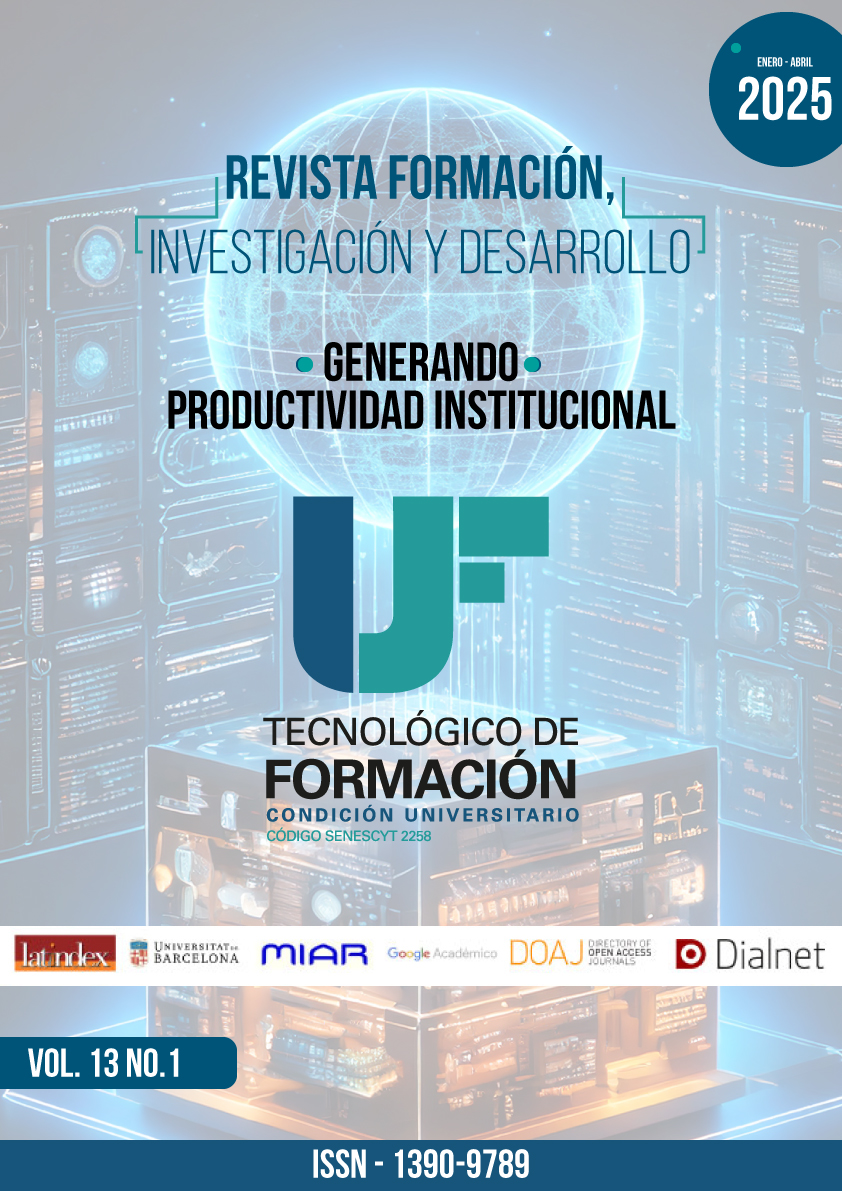Resilient and Inclusive Education in Crisis: Offline Innovation With Exelearning to Ensure Academic Continuity.
Main Article Content
Abstract
This article explores the implementation of offline educational tools, specifically eXeLearning, to ensure academic continuity in crisis contexts such as blackouts and natural disasters. Through a quasi-experimental design applied to 165 students in online, hybrid, and semi-presential modalities, the impact of this technology on academic progress and task submission is evaluated, with average increases of 23.34% and 21.67%, respectively. The research highlights the ability of eXeLearning to mitigate educational inequalities in communities with limited connectivity, promoting autonomous and inclusive learning. Additionally, innovative pedagogical strategies, such as gamification and project-based learning, are integrated with advanced technologies like artificial intelligence, reinforcing personalization and adaptability in teaching. This approach not only addresses educational needs during technological disruptions but also fosters essential socio-emotional skills for educational resilience. The findings demonstrate that combining offline tools with inclusive pedagogical methodologies is an effective solution to ensure equitable access to quality education, aligning with the Sustainable Development Goals (SDGs). The article concludes by emphasizing the urgency of adopting educational policies that prioritize hybrid models and flexible technologies to tackle future crises. These results open new perspectives on how offline tools can transform education, ensuring continuity and equity in adverse scenarios.
Article Details

This work is licensed under a Creative Commons Attribution-NonCommercial-ShareAlike 4.0 International License.
Este trabajo tiene licencia DE Atribución/Reconocimiento-NoComercial-CompartirIgual 4.0 Internacional. CC BY-NC-SA 4.0.
How to Cite
References
Al-Adwan, A., Alsoud, M., Li, N., Majali, T., Smedley, J., & Habibi, A. (2024). Unlocking future learning: Exploring higher education students' intention to adopt meta-education. Heliyon. https://doi.org/10.1016/j.heliyon.2024.e29544
Getenet, S., Cantle, R., Redmond, P., & Albion, P. (2024). Students’ digital technology attitude, literacy and self-efcacy and their efect on online learning engagement. International Journal of Educational Technology in Higher Education. https://doi.org/10.1186/s4123902300437y
Guzmán Jiménez, R., Escotto Córdova, E., Saldívar, Á., & Prem, D. (2022). SER0 Tawa Pukllay: sistema educativo remoto online/offline. Actas del Congreso Internacional de Ingeniería de Sistemas CIIS 2022: Entornos híbridos en la pospandemia: posibilidades para las nuevas tecnologías. https://doi.org/10.26439/ciis2022.6069
Hamad, F., Shehata, A., & Al Hosni, N. (2024). Predictors of blended learning adoption in higher education institutions in Oman: theory of planned behavior. International Journal of Educational Technology in Higher Education. https://doi.org/10.1186/s41239-024-00443-8
Hosman, L., Nova, R., Ahmed Mohammed Naji, O. A., & Alsaka, L. (2024). An Overview of Arabic Language Open Educational Resources (OER) for Primary and Secondary Education and Their Use in Offline Environments. The Electronic Journal of e-Learning (EJEL). https://doi.org/10.34190/ejel.22.9.3616
Lysytska, O., Mykytiuk, S., Chastnyk, O., & Mykytiuk, S. (2024). Foreign language teaching modes and adaptive methods in emergency education: Evaluation of first-hand experience. Multidisciplinary Science Journal. https://doi.org/10.31893/multiscience.2025069
Lytras, M., Serban, A., Torres Ruiz, M., Ntanos, S., & Sarirete, A. (2022). Translating knowledge into innovation capability: An exploratory study investigating the perceptions on distance learning in higher education during the COVID-19 pandemic - the case of Mexico. Journal of Innovation & Knowledge. https://doi.org/10.1016/j.jik.2022.100258
Moon, J., McNeill, L., Thomas Edmonds, C., Banihashem, S., & Norooz, O. (2024). Using learning analytics to explore peer learning patterns in asynchronous gamifed environments. International Journal of Educational Technology in Higher Education. https://doi.org/10.1186/s41239-024-00476-z
Muliaman, A. (2021). Efektivitas Model Project Based Learning Berorientasi eXeLearning dan Motivasi terhadap Hasil Belajar pada Materi Laju Reaksi. Jurnal Ilmu Pendidikan (JIP) STKIP Kusuma Negara Jakarta. https://doi.org/10.37640/jip.v13i1.956
Pietsch, M., Cramer, C., Brown, C., Aydin, B., & Witthöft, J. (2023). Open Innovation in Schools: A New Imperative for Organising Innovation in Education? Technology, Knowledge and Learning. https://doi.org/10.1007/s10758-023-09705-2
Rohmadi, M. (2021). Pemanfaatan eXe Learning Sebagai Media Belajar Dari Rumah Selama Pandemi Covid-19. Educatio: Jurnal Ilmu Kependidikan. https://doi.org/10.29408/edc.v16i1.3343
Siqiang, L., Kun, H., Quanlan, L., Jie, Z., Shumin, W., Li, H., Enzhong, L. (2024). Innovative integration of the “W+Flipped Classroom” and “B+BOPPPS” teaching models for enhanced learning outcomes. BMC Medical Education. https://doi.org/10.1186/s12909-024-06034-5
Walter, Y. (2024). Embracing the future of Artifcial Intelligence in the classroom: the relevance of AI literacy, prompt engineering, and critical thinking in modern education. International Journal of Educational Technology in Higher Education. https://doi.org/10.1186/s41239-024-00448-3
Wang, C., & Canagarajah, S. (2024). Postdigital ethnography in applied linguistics: Beyond the online and offline in language learning. Research Methods in Applied Linguistics. https://doi.org/10.1016/j.rmal.2024.100111
Xu, Z., Zhao, Y., Liew, J., Zhou, X., & Kogut, A. (2023). Synthesizing research evidence on self-regulated learning and academic achievement in online and blended learning environments: A scoping review. Educational Research Review. https://doi.org/10.1016/j.edurev.2023.100510
You, C., Awang, S., & Wu, Y. (2024). Bibliometric analysis of global research trends on higher education leadership development using Scopus database from 2013–2023. Discover Sustainability. https://doi.org/10.1007/s43621-024-00432-x
Yusuf, A., Pervin, N., & Román-González, M. (2024). Generative AI and the future of higher education: a threat to academic integrity or reformation? Evidence from multicultural perspectives. International Journal of Educational Technology in Higher Education. https://doi.org/10.1186/s41239-024-00453-6
Zhao, Y.-m., Liu, S.-s., & Wang, J. (2024). Application of data-driven blended online-offline teaching in medicinal chemistry for pharmacy students: a randomized comparison. BMC Medical Education. https://doi.org/10.1186/s12909-024-05701-x

